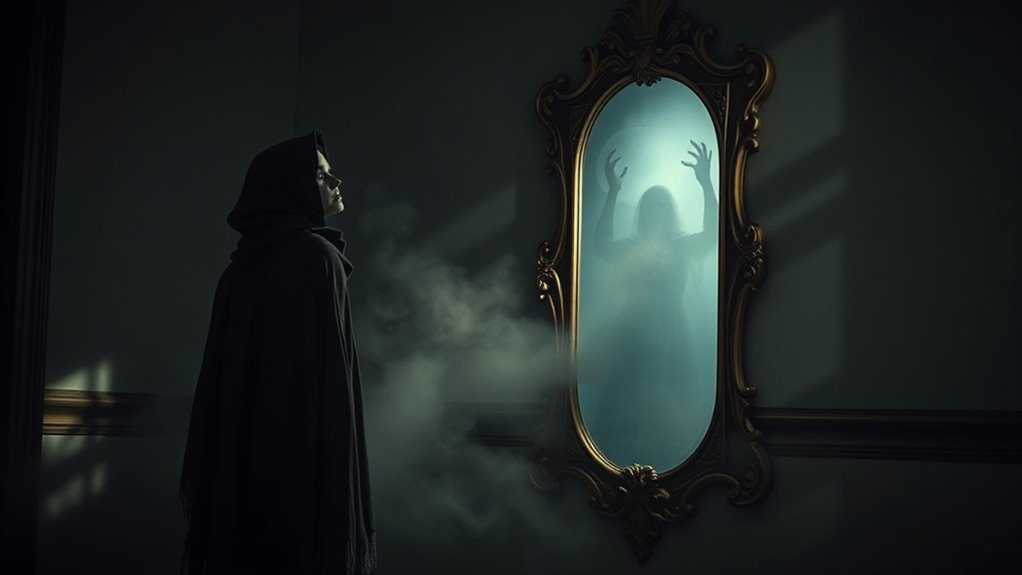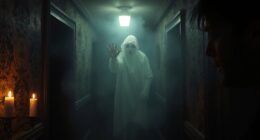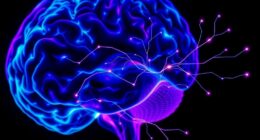Paranormal beliefs are shaped by cognitive biases and emotional experiences. When you encounter uncertainty, your brain seeks explanations, often leading you to supernatural interpretations. Confirmation bias makes you seek information that supports these beliefs. Social influences, like cultural narratives and validation from others, further reinforce them. Personal experiences can feel compelling and serve as powerful evidence, deepening your conviction. To understand these complex factors, it’s worth exploring the interplay between psychology and belief systems further.
Key Takeaways
- Cognitive biases, such as confirmation bias, lead individuals to seek and interpret information that supports their existing paranormal beliefs.
- Personal experiences, especially extraordinary ones, significantly reinforce belief in the paranormal by providing a sense of meaning and understanding.
- Social validation and comparison culture create an illusion of mass endorsement, encouraging individuals to adopt popular paranormal beliefs for uniqueness.
- Psychological factors, including cognitive deficits and intuitive thinking, can hinder critical assessment of paranormal beliefs, making them more appealing.
- Cultural narratives and local folklore shape interpretations of supernatural phenomena, intertwining personal beliefs with broader societal influences.
Cognitive Biases and Their Role in Paranormal Beliefs
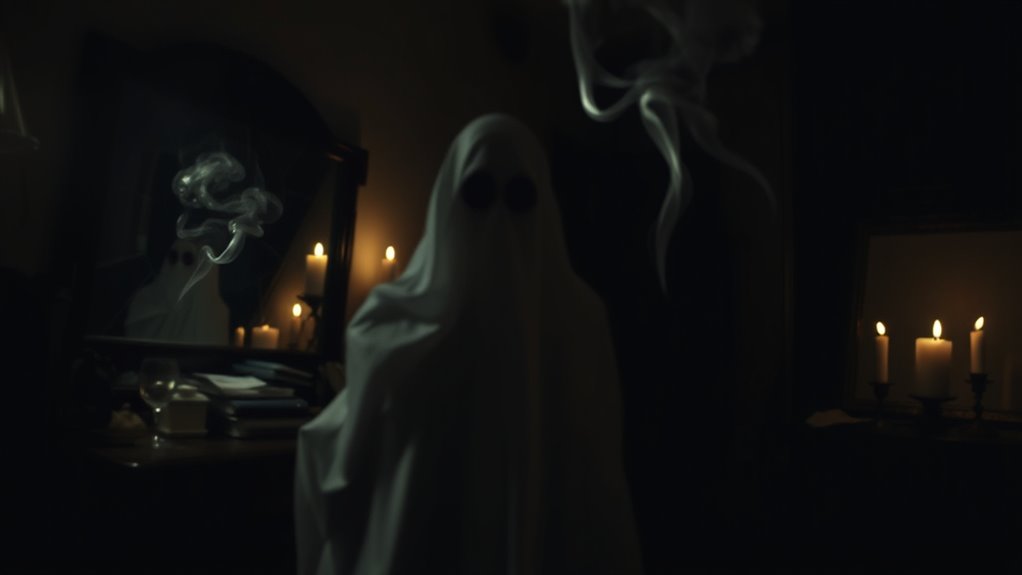
Cognitive biases play an essential role in shaping your beliefs about the paranormal, often leading you to see connections and patterns that aren’t really there. For instance, pareidolia makes you perceive faces in shadows, reinforcing your belief in ghosts. Additionally, narcissistic behavior can create a distorted view of reality, making it challenging to distinguish between genuine experiences and those influenced by cognitive biases. Celebrating the importance of relationships can also provide a grounding perspective, reminding you of the value of shared experiences over isolated beliefs.
Cognitive biases shape our beliefs about the paranormal, making us see patterns that reinforce our ghostly convictions.
You might also fall into confirmation bias, seeking out information that supports your views while ignoring anything contrary. Instead of analytical reasoning, intuitive thinking guides you, making supernatural explanations more appealing. You might even attribute random events to invisible agents, thanks to illusory agency detection. These biases not only distort reality but also amplify your beliefs, creating a cycle that’s hard to break. Understanding these biases can help you critically assess your experiences and challenge unrealistic views about the paranormal. Furthermore, the brain’s natural inclination to look for patterns can lead to misinterpretations of ordinary occurrences as supernatural, a phenomenon explored in the context of paranormal investigations. Additionally, adopting a mindset focused on spiritual awakening can enhance your awareness of personal beliefs and experiences, offering a broader perspective on reality.
Psychological Influencers Shaping Our Perceptions
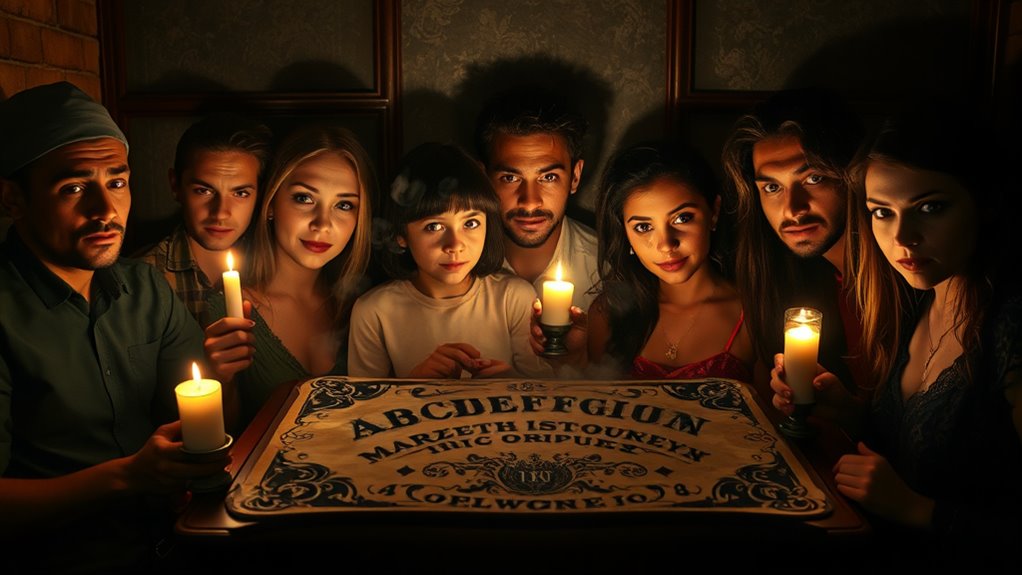
As you navigate social media, you mightn’t realize how much psychological influencers shape your perceptions, particularly regarding paranormal beliefs. They use social validation to create the illusion of mass endorsement, making you more likely to adopt their views. Influencers often foster parasocial relationships, leading you to feel intimate connections that enhance their impact. This emotional bond can manipulate your responses, especially when discussing paranormal phenomena. Moreover, social media influencers can drive trends in belief systems, further normalizing paranormal concepts within your social circles. Additionally, the comparison culture on social media can drive you toward adopting these beliefs as a means of feeling unique or superior. Algorithms amplify influencers’ messages, widening their reach and effectively spreading paranormal ideas. Together, these factors create a powerful influence on how you perceive the extraordinary. Furthermore, the enhanced natural language processing used by algorithms allows for more tailored content that resonates with your interests, further reinforcing these beliefs. An example of this is how certain air purifiers are promoted as essential for maintaining a healthy environment, subtly influencing your perception of their necessity. Interestingly, the age of the unit can significantly affect the efficiency of heat pumps, which highlights how various factors can shape our understanding and acceptance of different technologies. In recent years, the rise of spiritual retreats has also become a cultural phenomenon, reflecting a collective search for deeper meaning and connection in a chaotic world, much like the growing interest in halal lifestyles that emphasizes wellness and community.
The Impact of Personal Experience on Belief Formation
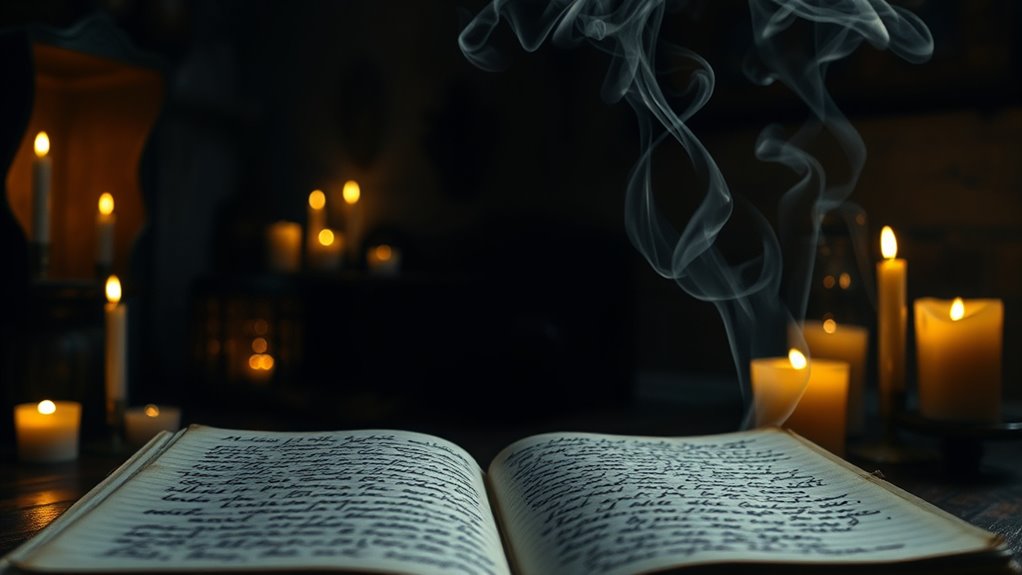
When you encounter a personal experience that feels extraordinary, it often triggers a deep search for meaning and understanding, greatly shaping your beliefs in the paranormal. These experiences can serve as powerful evidence, reinforcing what you already believe and pushing you to seek more encounters. During uncertain times, you might lean more heavily on internal explanations, interpreting your experiences through a paranormal lens. Cultural factors also play a major role, influencing how you make sense of these events. The interplay between your experiences and beliefs is reciprocal; each fuels the other. This dynamic, highlighted by models like Van Leeuwen and van Elk’s, shows how personal experiences can profoundly shape and evolve your beliefs in the paranormal domain. Widespread belief in the paranormal often emerges from these personal encounters, further intertwining your experiences with cultural narratives. In such cases, the importance of spiritual principles often becomes a guiding framework that helps individuals interpret their experiences. Furthermore, many individuals find that their interpretations of the paranormal are often influenced by local haunted folklore, which shapes their understanding of supernatural phenomena. Additionally, experiences of emotional dysregulation can lead individuals to seek out paranormal explanations as a way to process their feelings and find solace during distressing times. In light of these experiences, some individuals may turn to digital literacy programs, which can enhance their understanding of modern interpretations of the supernatural.
Understanding Paranormal Beliefs Through Cognitive Psychology

You might notice that individuals with stronger paranormal beliefs often struggle with cognitive control, leading to errors and slower reaction times. This tendency towards intuitive thinking can overshadow rational analysis, making it harder to question those beliefs. Additionally, cognitive deficits can further complicate the ability to critically assess these beliefs. The processes involved in predictive modeling can help explain how historical experiences influence current belief systems. Furthermore, experiencing family photoshoot fails can shape one’s view of reality and contribute to the development of paranormal beliefs when unexpected outcomes arise. Incorporating insights from auditory feedback therapy can enhance understanding of how individuals process and react to auditory stimuli, potentially affecting belief formation. To better comprehend these influences, it’s crucial to explore reader personas that reveal how personal experiences shape belief systems.
Moreover, individuals with low motivation levels may find it challenging to engage in critical thinking, leading to a reliance on motivational strategies that reinforce their existing beliefs. Cognitive biases, like confirmation bias, push you to seek information that supports your views, reinforcing them further. Additionally, the human need for explanations can drive you toward paranormal beliefs when faced with the unknown.
Cultural narratives also play a role, weaving stories that align with your beliefs. Understanding these cognitive mechanisms can help you evaluate and possibly challenge your own beliefs about the paranormal.
Statistical Insights Into Belief in the Paranormal
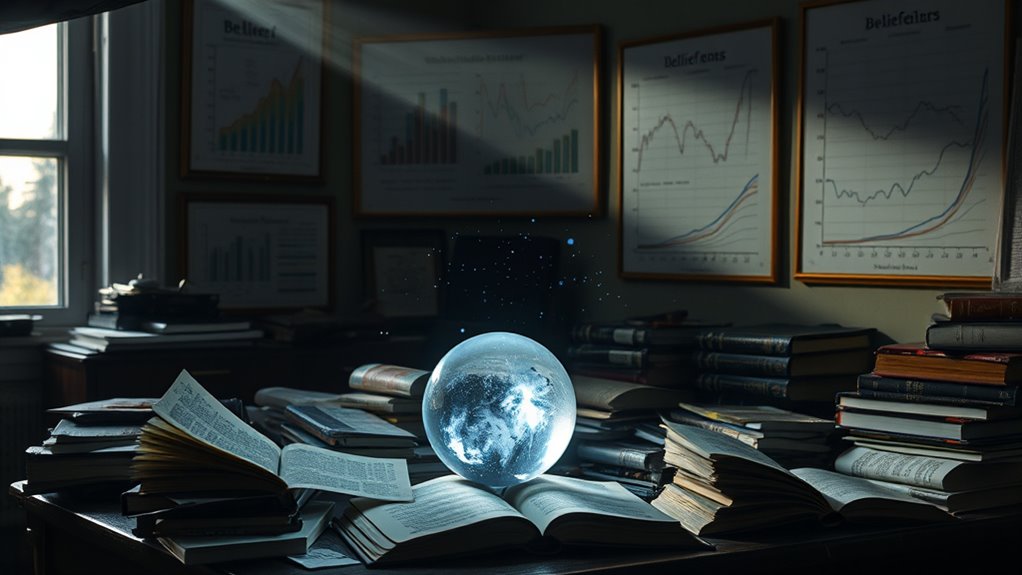
Belief in the paranormal is surprisingly common, with statistical evidence revealing significant variations across demographics and cultures. In the U.S., about 41% of adults believe in ghosts, while 64% endorse at least one paranormal phenomenon. This aligns with the notion of prophetic dreams as a widely acknowledged aspect of paranormal beliefs. Interestingly, individuals from households where infidelity occurred may also seek paranormal explanations for emotional distress and instability. Processing loss can further influence how individuals interpret and engage with paranormal beliefs during times of emotional upheaval. Additionally, many people turn to routine health checks to seek comfort and understanding in their experiences during difficult times. Psychological factors, including narcissistic tendencies, can also shape individuals’ susceptibility to paranormal beliefs, as these traits often lead to a desire for control and understanding in chaotic situations.
Across the pond, around one-third of British adults express belief in the paranormal, with many more unsure. In the Netherlands, 55.6% of respondents acknowledge single phenomena like clairvoyance. Notably, women generally report higher belief rates than men. Cultural backgrounds also play an essential role, influencing the types and intensity of beliefs held. These insights highlight how prevalent paranormal beliefs are and how they differ based on gender, culture, and personal experiences.
The Psychological Needs Fulfilled by Paranormal Beliefs
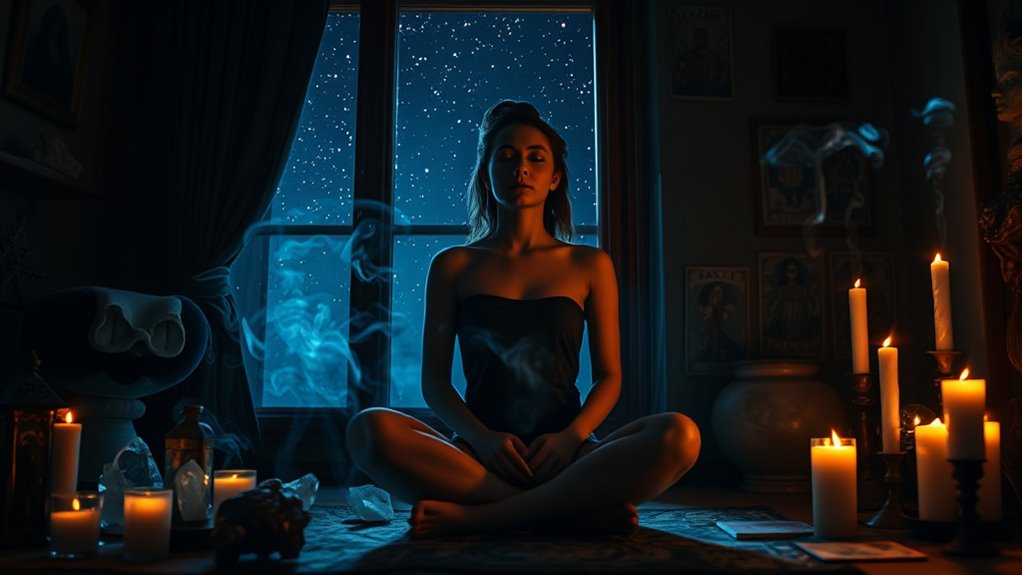
Paranormal beliefs serve as a psychological anchor for many people, fulfilling essential needs that shape their understanding of the world. They create an illusion of control, allowing you to feel mastery over unpredictable events. By providing frameworks for life’s mysteries, these beliefs offer meaning and purpose, helping you find your place in the universe. Socially, they validate your experiences through shared stories, enhancing emotional connections. The thrill of paranormal encounters can be exciting, feeding your curiosity and desire for exploration. While these beliefs may also reflect deeper psychological needs, like hope and morality, they can sometimes lead to distress or social exclusion. Ultimately, they shape not just your beliefs, but your psychological functioning and overall well-being. This fascination with the paranormal is fueled by the brain’s tendency for pattern recognition, often leading individuals to perceive significance in ambiguous stimuli.
Frequently Asked Questions
How Do Childhood Experiences Influence Paranormal Beliefs in Adulthood?
Childhood experiences shape your beliefs in profound ways.
If you faced trauma, you might find comfort in paranormal beliefs, seeing them as a way to regain control over your life. Those early feelings of powerlessness can lead you to embrace fantasy and seek explanations in the unknown.
As you navigate adulthood, these beliefs can serve as coping mechanisms, influencing how you perceive and interpret your surroundings, often reflecting your past experiences.
Can Paranormal Beliefs Change Over Time With New Information?
Yes, paranormal beliefs can change over time with new information.
When you encounter scientific explanations for previously unexplained phenomena, your perspective may shift. If you actively seek out information and challenge your beliefs, you’re more likely to adapt.
However, if you cling to confirmatory bias or rely on intuitive thinking, you might resist change. Engaging with diverse viewpoints and experiences can help you reshape your understanding and beliefs about the paranormal.
What Role Does Personality Play in Believing in the Paranormal?
Imagine standing at the edge of a foggy cliff, feeling the thrill of the unknown. Your personality shapes how you perceive that fog.
If you’re open to experience, you might see mystical possibilities; if you’re conscientious, you’ll likely seek rational explanations.
Research shows that traits like emotionality and extraversion can lead to stronger paranormal beliefs, while higher cognitive ability often breeds skepticism.
Your personality acts as the lens through which you view the mysterious world around you.
Are There Specific Cultural Factors That Intensify Paranormal Beliefs?
Yes, specific cultural factors can definitely intensify your paranormal beliefs.
For instance, local legends and traditions create a framework that supports these beliefs, while societal norms shape how acceptable they’re within your community.
Additionally, media representations can amplify interest and engagement, especially among younger individuals.
If your culture emphasizes supernatural explanations for events, you’re likely to adopt those beliefs more readily, reinforcing the cycle of paranormal fascination.
How Do Paranormal Beliefs Affect Mental Health and Well-Being?
Imagine believing that ghosts are lurking around every corner—it can drive anyone to the brink!
Your paranormal beliefs can seriously impact your mental health and well-being. They often lead to heightened anxiety and stress, making you feel like the world’s out to get you.
While these beliefs might seem harmless, they can distort your perception and lower self-efficacy, causing significant distress.
Recognizing this link is vital for your overall mental wellness.
Conclusion
So, the next time you find yourself jumping at shadows or pondering that strange noise in the night, remember: your brain’s playing tricks on you! It’s like a magician pulling rabbits from hats, only it’s your mind crafting wild stories to fulfill your need for wonder and certainty. Embrace the quirks of your psyche, because who wouldn’t want a sprinkle of the supernatural in their life? After all, isn’t it more fun to believe in ghosts than just boring old reality?
